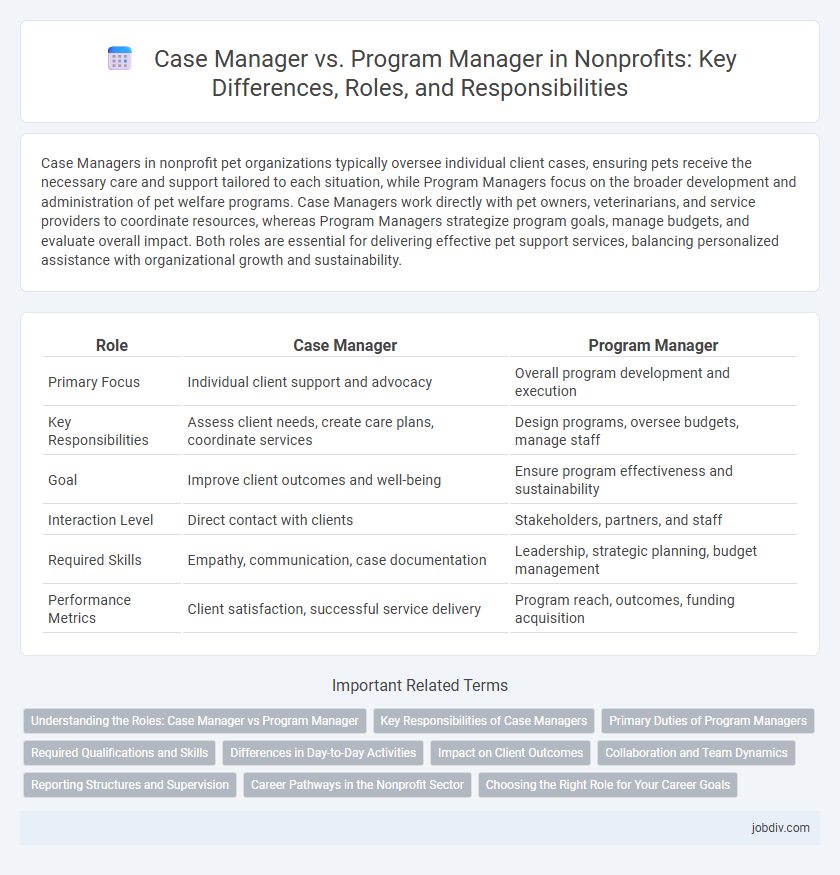Case Managers in nonprofit pet organizations typically oversee individual client cases, ensuring pets receive the necessary care and support tailored to each situation, while Program Managers focus on the broader development and administration of pet welfare programs. Case Managers work directly with pet owners, veterinarians, and service providers to coordinate resources, whereas Program Managers strategize program goals, manage budgets, and evaluate overall impact. Both roles are essential for delivering effective pet support services, balancing personalized assistance with organizational growth and sustainability.
Table of Comparison
| Role | Case Manager | Program Manager |
|---|---|---|
| Primary Focus | Individual client support and advocacy | Overall program development and execution |
| Key Responsibilities | Assess client needs, create care plans, coordinate services | Design programs, oversee budgets, manage staff |
| Goal | Improve client outcomes and well-being | Ensure program effectiveness and sustainability |
| Interaction Level | Direct contact with clients | Stakeholders, partners, and staff |
| Required Skills | Empathy, communication, case documentation | Leadership, strategic planning, budget management |
| Performance Metrics | Client satisfaction, successful service delivery | Program reach, outcomes, funding acquisition |
Understanding the Roles: Case Manager vs Program Manager
Case Managers in nonprofits directly support clients by assessing needs, coordinating services, and ensuring personalized care plans to improve individual outcomes. Program Managers oversee the planning, implementation, and evaluation of multiple projects or services, focusing on achieving broader organizational goals and maximizing program effectiveness. Understanding these distinct roles enhances team collaboration and optimizes service delivery within nonprofit organizations.
Key Responsibilities of Case Managers
Case Managers in nonprofits oversee individualized client services, focusing on assessment, care planning, and coordination to meet diverse needs. They maintain detailed documentation, monitor progress, and advocate for clients to access appropriate resources. Effective communication and crisis intervention skills are essential to support client empowerment and long-term success.
Primary Duties of Program Managers
Program Managers in nonprofits oversee the planning, implementation, and evaluation of multiple projects to ensure alignment with organizational goals and community needs. They allocate resources, manage budgets, and coordinate with stakeholders to optimize program impact and sustainability. Their role involves strategic leadership, performance monitoring, and ensuring compliance with funding requirements and regulations.
Required Qualifications and Skills
Case Managers require strong interpersonal and assessment skills to coordinate client services and advocate effectively for individual needs, often needing certifications like Certified Case Manager (CCM). Program Managers must possess strategic planning, budgeting, and leadership abilities to oversee multiple projects, with qualifications typically including a degree in nonprofit management or related fields. Both roles demand excellent communication and problem-solving skills, but Program Managers emphasize organizational and analytical expertise for broader program outcomes.
Differences in Day-to-Day Activities
Case Managers primarily engage in direct client interaction, assessing individual needs, creating personalized service plans, and coordinating access to community resources. Program Managers focus on overseeing the design, implementation, and evaluation of entire programs, managing budgets, staff, and compliance with grant requirements. While Case Managers work on frontline service delivery, Program Managers handle strategic planning and operational oversight to ensure program effectiveness.
Impact on Client Outcomes
Case managers directly influence client outcomes by providing personalized support, coordinating resources, and ensuring clients access necessary services promptly. Program managers impact outcomes by designing, implementing, and evaluating programs that address community needs on a broader scale, optimizing service delivery frameworks. Both roles are essential, with case managers focused on individual client success and program managers enhancing overall program effectiveness and reach.
Collaboration and Team Dynamics
Case Managers in nonprofits focus on direct client interactions, ensuring personalized support and addressing individual needs, while Program Managers oversee broader program implementation and strategic planning. Effective collaboration between these roles enhances service delivery by combining hands-on case insights with program-wide coordination. Strong team dynamics emerge when both roles communicate consistently, aligning case-level feedback with program goals to optimize outcomes.
Reporting Structures and Supervision
Case Managers typically report to Program Managers, forming a direct supervision link that ensures client services align with program goals. Program Managers oversee multiple Case Managers, providing strategic guidance, performance evaluations, and resource allocation across projects. Clear hierarchical reporting structures enhance accountability and streamline communication within nonprofit organizations.
Career Pathways in the Nonprofit Sector
Case Managers in the nonprofit sector specialize in direct client support, focusing on individualized service coordination and resource linkage, which builds foundational skills in client advocacy and crisis intervention. Program Managers oversee the design, implementation, and evaluation of nonprofit initiatives, requiring strategic planning, team leadership, and budget management expertise that pave the way for higher-level executive roles. Career pathways often progress from Case Manager to Program Manager, with skill development in program oversight and organizational strategy facilitating advancement into senior management positions within nonprofits.
Choosing the Right Role for Your Career Goals
Case managers in nonprofits primarily focus on direct client interaction, assessing needs, and coordinating personalized services, making this role ideal for those passionate about hands-on support and individual impact. Program managers oversee multiple projects, manage budgets, and lead teams to ensure program success, fitting professionals aiming for strategic planning and organizational leadership. Aligning your choice with career aspirations involves evaluating your preference for direct client engagement versus broader program oversight and administrative responsibilities.
Case Manager vs Program Manager Infographic

 jobdiv.com
jobdiv.com